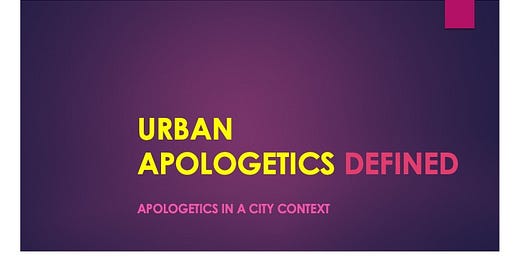URBAN APOLOGETICS: APOLOGETICS in the CITY CONTEXT
A brief introduction to the specific field of urban apologetics by Christian theologian VOCAB MALONE
MAY 10, 2023
Many are finding out that the objections and issues presented in urban communities differ significantly from those presented in typical books on apologetics. A very different set of religious ideas exist within “urban culture”, so most mainstream texts contain little information about them.
Urban apologetics is a culturally contextualized faithful explanation and trustworthy defense of the Christian worldview. Urban apologetics is a specialized field under the broad umbrella of general apologetics. This is where Colossians 4:5-6 comes in play:
Walk in wisdom toward outsiders, making the best use of the time.
Let your speech always be gracious, seasoned with salt,
so that you may know how you ought to answer each person.
~ Colossians 4:5-6
WHAT IS APOLOGETICS?
Apologetics is a faithful explanation and trustworthy defense of the Christian worldview. My former professor (name drop alert!), Dr. JP Moreland, defines apologetics as “the ministry which seeks to provide rational grounds for believing Christianity and to respond to objections raised against Christianity” (JP Moreland, Love Your God With All Your Mind: The Role of Reason in the Life of the Soul, p 131).
In apologetics, the follower of Christ gives reasons for their hope, to use the Petrine parlance of 1 Peter 3:15. Apologetics involves defense, offense, and proof. In his “Van Til Glossary”, John M. Frame defines proof as an “argument that establishes the truth of a conclusion”. I have a few audio recordings on the subject of apologetic methodology (see “What is Presuppositional Apologetics”? and “Covenantal Apologetics with Dr. K. Scott Oliphint”)
WHAT IS THE CULTURAL CONTEXT OF URBAN APOLOGETICS?
The cultural context for urban apologetics is the city and those who are deeply influenced by the city and its zeitgeist movements and its cultural trends, especially trends of thought. The specific urban apologetics context I focus on is primarily cities in the United States. Yet, because of the influence of the United States, the reach of the Internet, and the strength of hip hop culture, urban apologetics issues have global import and impact. Urban and hip hop culture are unique in the way they can quickly spread from the block to the boardroom.
Indeed, urban apologetics starts (but doesn’t “end”) with the block. That’s why we need doctrine “tailored” for the block. In short: urban apologetic matters matter. As Dr. Carl Ellis observes, “traditional apologetics has largely remained silent on many forms of controversy and unbelief associated with contemporary realities of the ‘hood’” and “this gap becomes more prevalent as issues we have associated with the ‘hood’ spill over into mainstream culture.” (Christopher W. Brooks, Urban Apologetics: Why the Gospel is Good News for the City, p 8).
WHAT DOES “URBAN” MEAN?
Urban apologetics is a specialized apologetics ministry which takes place in light of the urban cultural context. The urban context is roughly synonymous with the city context. City is a big word, though. Urban apologetics tends to deal more so with the inner city, as opposed to, a gentrified part of the city. Isaac Adams and Thabiti Anyabwile expound on this in their FrontPorch article:
There’s a growing interest in “urban apologetics”. By “urban,” most people mean dense ethnic neighborhoods usually in the inner-city. “Apologetics” simply means defense. In Christian terms, people are trying to find effective ways of defending the faith among people in the inner-city. That means becoming familiar with the concerns and objections of urbanites who may either be unfamiliar with Christian claims or oppose those claims with arguments of their own. - “Urban Apologetics 1, An Introduction”, Oct 10, 2017
The phrase “inner city” is slippery, though. Inner city is often sloppily employed to denote poor black and brown neighborhoods within the city. These deprived neighborhoods are often assumed to be primarily populated by what mainstream US society calls “ethnic minorities” (although those demographics have changed and are changing). This is problematic, too.
It is a major mistake to conflate ethnic minority with poor, uneducated, or someone who lives in the ghetto. You must never make this error. People who make this gross error often do so due to ignorance, sometimes due to bigotry, and sometimes due to both.
This is one reason I am thankful for the hard work of Lisa Fields of the Jude 3 Project. Lisa has successfully reminded everyone black does not mean hood, to which I would add, bown does not mean hood, either. This is significant because many urban apologetics discussions ignore the black middle class, upper middle class, and intellectual elite. Part of Lisa’s mission is to rectify that problem (see her brief but helpful, “Urban and Black Are Not Synonymous”).
For more on this, check out my livestream entitled “Apologetics and Cultural Context”. Available online below:
DIFFERENT DEMOGRAPHICS, DIFFERENT APOLOGETICS
To reiterate: black does not mean hood and hood does not necessarily mean black. Brown does not mean hood and hood does not necessarily mean brown. And on it goes. Still, we recognize the context in which groups like the “Hebrew Israelites” and Kemets flourish: within black and brown communities (both physical and online).
I live in Phoenix, a huge, sprawling city in Arizona, located in the southwestern region of the United States. Phoenix is right above Philadelphia, Pennsylvania, in terms of population. It is the fifth largest US city, at about five million metro strong. It’s also one of the fastest growing cities in the United States. Phoenix culture and demographics are different than the culture and demographics of Chicago, Detroit, Atlanta, Philadelphia, Cleveland, or New York City. Barely 7% of the population in Phoenix is black, while almost half (46%) is considered Hispanic in metro Phoenix. I recognize that all of these terms all have problems, I am just trying to communicate.
When it comes to religion, there are more Roman Catholics than Protestants in Phoenix. In Phoenix, The Church of Jesus Christ of Latter Day Saints (Mormons) isn’t that far behind the Protestants, as far as reported members. The demographics are different, the neighborhoods are different, and to an extent, the apologetic issues are different. There is an overlap when you compare culture, demographics, and apologetic questions, especially when you compare Phoenix to places like Los Angeles, Las Vegas, Denver, Albuquerque, San Diego, or even Dallas.
When I have an apologetics conversation with someone in Phoenix, it’s usually a bit different than it is with someone from the East Valley suburbs. Part of being an urban apologist is simply being aware of that fact; the reality of context. It doesn’t mean you put people in a box based on who they are or where they stay, but it does mean you are in touch with those realities and can “flow” accordingly.
When we here in Phoenix throw our annual urban apologetics conference called Doctrine for the Block, we purposefully give it a distinctive flavor. We serve amazing Mexican food in between sessions. We have an open mic and afterparty concert with Christian hip hop artists. We make sure the content includes issues relating to Roman Catholicism. Sometimes, the needs of Hispanic American communities get left out in discussions surrounding urban apologetics. All this is to say that the cultural context of any given urban apologetics scenario may not be identical, especially city to city, neighborhood to neighborhood. Yet, issues are similar enough that it still makes sense to use the phrase “urban apologetics” … even though most of us aren’t exactly crazy about the phrase.
LEARN MORE ON THE IMPORTANT MINISTRY OF URBAN APOLOGETICS
This post is adapted from a chapter in my book, Streel-Level Apologetics. The book focuses on apologetic methodology, tactics, apologetic examples in the Bible, and much more. In Street-Level Apologetics, you will learn more about what provides fuel in the tank for the new alternative urban spiritualities, such as the “Hebrew Israelites, but others as well. (As you may know, the main urban apologetic challenge I focus on is the challenge of the so-called “Hebrew Israelites”. My first book was about their beliefs and history). You will learn about the increasingly popular perception of the ever-present challenge of one’s religious identity over and against one’s ethnic identity. You will learn the current cultural context of urban apologetics. Pick it up!





